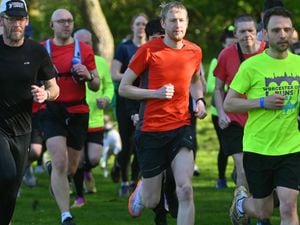Bear Grylls speaks ahead of Birmingham live show
A near death experience gave Bear Grylls the motivation to take a risk and climb Everest. He talks about his achievements and loves in life...
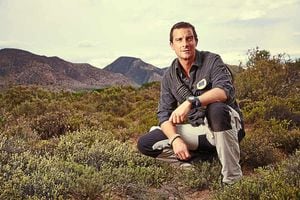
He feels like he's been whacked. Bear Grylls has been hanging upside down preparing for his first arena tour. And while he's been suspended from some Godforesaken hoist, he's been thinking this: "What the hell have I got myself into?"
Each evening, he's gone home battered and bruised. But he's also gone home happy. For the world's coolest adventurer-cum-survival expert is onto something good. Mean, lean and super keen: Bear's about to stun fans around the world with a new arena show, Endeavour.
It's a project that fans won't watch from the comfort of their sofas. Bear will be visiting arenas across the UK – including Birmingham's Genting next weekend – before jetting off around the world to tour America, China, Australia and beyond.
And he's wired about the new show.
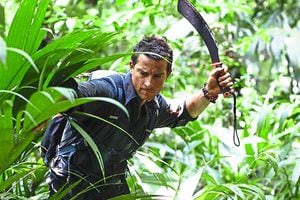
"Endeavour is a special one, that's for sure. It's taken us two years to put this project together. It's the start of a global tour that kicks off in the UK. It's grown into this beast. We've got 130 crew, 20 trucks of gear and 8km of cabling.
"It's a real spectacle. I'm really proud of it. Of all the projects that I've got on, it's got my heart. It's got my n*** in my hand too." And we pause, momentarily, not knowing whether to laugh or suck the air over our teeth.
Bear's been rehearsing in Pinewood on the big 007 stage, which is fitting for a man who is to all intents and purposes a real life James Bond.
"We've got aerial acrobats training me and there's been moments when I've been hanging upside down wondering what on earth I'm doing.
"The premis is that we turn arenas into jungles, mountains deserts or environments under the sea." Don't worry, if you're going, you won't get wet. . . probably.
"We do it with amazing new mapping technology. You can transform these spaces into something totally different. You can make the audience feel like they're in the jungle. With the aerial stuff, we recreate avalanches and crevasse falls or float in space. We tell some of the greatest stories of adventure and endeavour through human history. Some can be very moving and even quite gory. By the end of the night, it's meant to make the audience feel like they can conquer the world."
The genesis of Endeavour was one of Bear's many books. In 2013, he released True Grit, which focused on some of the most remarkable people who've ever lived.
"True Grit was about retelling the greatest stories of all time. It was about putting them into bite sized chunks rather than entire books. So the story of Shackleton was told over eight pages rather than 400.
"Endeavour really came to the boil when I watched a Cirque du Soleil show in Vegas. I thought about how cool it would be to take some of those great stories and literally recreate them on stage. So for Endeavour, we are bringing adventure into the arenas. That's what we've done. We worked out which stories would translate best and picked six of them, from the Arctic to the High Mountains.
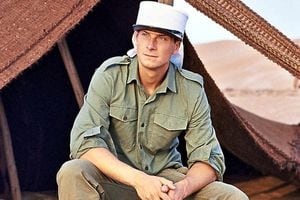
"It's gone well in rehearsal. I was with a Pinewood guy last night, a technician who has worked on everything and knows the lot. He came up to me last night saying he'd worked on all the shows over the years but he thought Endeavour was unique. He told me I should be proud of it, which was nice to hear."
Bear will be on stage throughout, front and centre, performing something like 120 different aerial stunts during two 45-minute halves. And then he'll sleep like a baby. "It's intensely physical. I feel beaten up after a week of training."
His military training prepared him for a life in front of the camera as the world's leading survival expert and adventurer. After being educated at Eton, he signed up. But disaster struck in 1996 when he suffered a freefall parachuting accident in Zambia, when his chute ripped at 4,900 metres, causing him to fall and land on his back, crushing three vertebrae. It was the turning point in his life. He came within a whisker of being paralysed and spent the next 12 months in and out of military rehabilitation at Headley Court.
He determined to recover. While there are those who might have feared their life would end – and, Bear readily admits, he did for a while too – he set himself the target of climbing Everest as part of his recovery.
"Everest is a big old mountain and still claims a lot of people's lives every year. When we climbed it, it had a one-in-six death rate among those attempting to climb it. I'd broken my back before then so Everest was very much the focus for my recovery. It had been a big goal and it was a real turning point in my life. I was lucky to reach the top. We had four other climbers lose their lives so I was grateful just to be alive. For me, Everest was a reminder that you have to grab life and take a few risks. It was a big reminder. I wasn't just going to be beaten because of my parachuting accident.
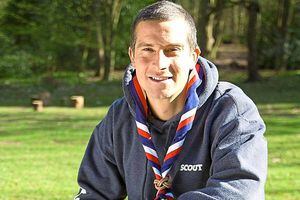
"Of course, you go through highs and lows all the time and that was particularly true of me after the parachute accident. But it just makes you more determined to grab life. There are times when you realise you're going backwards and are in pain.
"And then there are times when everyone is sympathetic for a while before moving on. That era gave me a dark journey but that's life. Storms make us stronger. Would I have done the other stuff in my life if that hadn't happened? Probably not. I had to rebuild my belief and Everest helped me do that. There were times when I didn't know if I'd walk again, let alone climb. So now I never take anything for granted. I should have died so many times but I'm still here."
Bear's transition from military man to household name was gradual. It wasn't planned, it was just the way things worked out. He'd found himself at a loose end following his parachuting accident but his Everest ascent made him hot property.
"It just came together slowly. It was very gradual. I left the military and then did the Everest stuff. Then Channel 4 asked me to do a show on the French Foreign Legion. I went through basic training in the desert and then things picked up and the Discovery Channel got involved. After that it was Man vs Wild and we did eight years of that. It was non-stop and we were just out in the States. It was a pain to do it at the time because I was endlessly away, my mum didn't see it and I didn't get home. But that really built the foundation for what's happened in America and that was the market to crack.
"When I think about it now, I feel as though I've been so lucky because Man vs Wild opened so many doors.
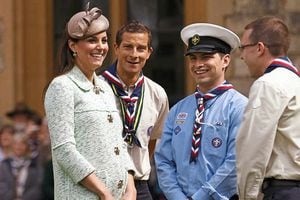
"The UK stuff just followed and it's just grown and grown."
Not every show has been a hit and there are things that Bear might have done differently.
"You fall down, you get up. Some shows are great, some do less well. There's been a few clear winners. But now I'm just focused on the live show because it's so cool to do. There's something special about performing live, otherwise all our year is endless TV. To be honest, I don't really like the TV stuff as much. I struggle with the cameras. To do something live, that makes me so excited. I've got the family with me so I have to lay it on line."
Bear's TV work now features other stars, from Mel B to Zac Efron and Bell Stiller. He enjoys the interaction with others, rather than being the sole focus of the camera's attention.
"I did eight years on my own and so it was lovely when we started to take other people. The wild is about empowering people and giving them that quiet sense of pride. It's about being authentic. To take people who've never done those sorts of thing before can be very moving. In many ways, those shows are what happens with the Scouts and that's why I love being part of that organisation. Forget about the TV. When you're working with Scouts you see people grow before your eyes."
Ah yes, Scouting. In 2009, The Scout Association appointed Bear as its Chief Scout, replacing Peter Duncan. He became the youngest to ever hold the role, aged 34, since Robert Baden-Powell founded the movement in 1910. Having served a five-year term, the organisation announced that he would remain in the role. Bear loves it. "Scouting is the proudest job I do. It's all about giving young kids from all different backgrounds the chance to have an adventure that they might not otherwise have. They get outdoor experience and good friendships and good values about loyalty and respect.
"It's amazing, I've done the job for eight years and every day it's mind-blowing. It's incredible when you think about the dedication that adult volunteers have every day and that's why the movement is growing so fast. There are now 40 million scouts around the world. Do you know, at the refugee camps in Syria, the people they trust most are Scouts because they see the neckerchief and know that they can be trusted.
"We do a survival school where we take teenagers from all over the country and put them through a really full-on survival boot camp. It's incredible seeing their lives change. The wild is great for all people, whether it's the President of the USA or a kid from the back end of Glasgow. It rewards courage and commitment and kindness."
Bear's former career in the military prepared him for his adventures in TV, publishing, the stage and beyond. It equipped him with the resolve and determination to combine and tackle so many different challenges.
"Certainly, my work in the forces gave me a lot of the skills that I've used in my job now, from combat survival to sky diving to the belief that I can look after myself when the chips are down.
"It gave me some of the best friends of my life and those people are still my friends today."
Away from the stage, Bear finds time to give motivational speeches to corporations, schools and other organisations. It's no surprise. You're unlikely to find many people as positive.
"I do quite a few of those around the place and I tell stories. I say what helped me in dark times and how teamwork boils down to being a friend and going the extra mile in big moments and being cheerful in adversity. It's about managing risk and understanding leadership. When you're out in the wild, you live and breathe it.
"When you have so much on, you have your moments. But it's good, you know. I'm lucky, I'm fit and healthy and strong. We've been given this great platform where people want to watch this stuff. So for me, it's like the scouts say: Do Your Best."
Bear Grylls presents Endeavour at Birmingham's Genting Arena on Saturday, October 22, 7.30pm. Tickets cost from £28.30. Visit www.theticketfactory.com or call 0844 33 88 222.
By Andy Richardson



